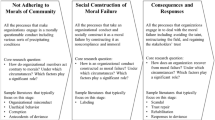Abstract
The purpose of this article is to provide a theoretical review of the moral disengagement literature, integrating research that has been completed as well as identifying thought lacunas, including the subfield of organizational moral disengagement. It is proposed that because moral disengagement is an inherently interpersonal phenomenon, organizational moral disengagement should be a salient concern of both organizational and management researchers. A conceptual framework of organizational moral disengagement is suggested, examining moral disengagement at both the employee as well as manager/executive level. Lastly, a series of propositions are proffered in order to provide direction to organizational moral disengagement researchers, including the proposition that moral disengagement is a function of interpersonal proximity and the possession or lack of organizational power. Methods for effectively studying organizational moral disengagement are suggested.

Similar content being viewed by others
References
Aquino, K., Reed, A., Thau, S., & Freeman, D. (2007). A grotesque and dark beauty: How moral identity and mechanisms of moral disengagement influence cognitive and emotional reactions to war. Journal of Experimental Social Psychology, 43(3), 385–392. doi:10.1016/j.jesp.2006.05.013.
Bandura, A. (1986). Social foundations of thought and action: A social cognitive theory. Englewood Cliffs, NJ: Prentice-Hall, Inc.
Bandura, A. (1999). Moral disengagement in the perpetration of inhumanities. Personality and Social Psychology Review, 3(3), 193–209. doi:10.1207/s15327957pspr0303_3.
Barsky, A. (2011). Investigating the effects of moral disengagement and participation on unethical work behavior. Journal of Business Ethics, 104(1), 59–75. doi:10.1007/s10551-011-0889-7.
Beu, D. S., & Buckley, M. R. (2004). This is war: How the politically astute achieve crimes of obedience through the use of moral disengagement. The Leadership Quarterly, 15(4), 551–568. doi:10.1016/j.leaqua.2004.05.007.
Burger, J. M. (2009). Replicating Milgram: Would people still obey today? The American Psychologist, 64(1), 1–11.
Caprara, G. V., Fida, R., Vecchione, M., Tramontano, C., & Barbaranelli, C. (2009). Assessing civic moral disengagement: Dimensionality and construct validity. Personality and Individual Differences, 47(5), 504–509. doi:10.1016/j.paid.2009.04.027.
Castano, E. (2008). On the perils of glorifying the in-group: Intergroup violence, in-group glorification, and moral disengagement. Social and Personality Psychology Compass, 2(1), 154–170. doi:10.1111/j.1751-9004.2007.00040.x.
Claybourn, M. (2011). Relationships between moral disengagement, work characteristics and workplace harassment. Journal of Business Ethics, 100(2), 283–301. doi:10.1007/s10551-010-0680-1.
Congressional Budget Office. (2010). Fannie Mae, Freddie Mac, and the federal role in the secondary mortgage market. Congressional Budget Office: Congress of the United States.
Detert, J. R., Treviño, L. K., & Sweitzer, V. L. (2008). Moral disengagement in ethical decision making: A study of antecedents and outcomes. The Journal of Applied Psychology, 93(2), 374–391. doi:10.1037/0021-9010.93.2.374.
Duffy, M. K., Scott, K. L., Shaw, J. D., Tepper, B. J., & Aquino, K. (2012). A social context model of envy and social undermining. Academy of Management Journal, 55(3), 643–666. doi:10.5465/amj.2009.0804.
Jackson, L. E., & Gaertner, L. (2010). Mechanisms of moral disengagement and their differential use by right-wing authoritarianism and social dominance orientation in support of war. Aggressive Behavior, 36(4), 238–250. doi:10.1002/ab.20344.
Johnson, J. F., & Connelly, S. (2012). Moral emotions, moral disengagement, and ethical decision-making: Can guilt inhibit and can shame enhance the effects of moral disengagement on ethical decisions? Unpublished masters thesis, University of Oklahoma, Norman.
Leidner, B., Castano, E., Zaiser, E., & Giner-Sorolla, R. (2010). Ingroup glorification, moral disengagement, and justice in the context of collective violence. Personality and Social Psychology Bulletin, 36(8), 1115–1129. doi:10.1177/0146167210376391.
McAlister, A. L., Bandura, A., & Owen, S. V. (2006). Mechanisms of moral disengagement in support of military force: The impact of Sept. 11. Journal of Social and Clinical Psychology, 25(2), 141–165. doi:10.1521/jscp.2006.25.2.141.
Milgram, S. (1965). Some conditions of obedience and disobedience to authority. Human Relations, 18(1), 57–76.
Moore, C. (2007). Moral disengagement in processes of organizational corruption. Journal of Business Ethics, 80(1), 129–139. doi:10.1007/s10551-007-9447-8.
Moore, C., Detert, J. R., Treviño, L. K., Baker, V. L., & Mayer, D. M. (2012). Why employees do bad things: Moral disengagement and unethical organizational behavior. Personnel Psychology, 65(1), 1–48. doi:10.1111/j.1744-6570.2011.01237.x.
Murphy, P. R., & Dacin, M. T. (2011). Psychological pathways to fraud: Understanding and preventing fraud in organizations. Journal of Business Ethics, 101(4), 601–618. doi:10.1007/s10551-011-0741-0.
Naquin, C. E., Kurtzberg, T. R., & Belkin, L. Y. (2010). The finer points of lying online: E-mail versus pen and paper. The Journal of Applied Psychology, 95(2), 387–394. doi:10.1037/a0018627.
Osofsky, M. J., Bandura, A., & Zimbardo, P. G. (2005). The role of moral disengagement in the execution process. Law and Human Behavior, 29(4), 371–393. doi:10.1007/s10979-005-4930-1.
Perren, S., & Gutzwiller-Helfenfinger, E. (2012). Cyberbullying and traditional bullying in adolescence: Differential roles of moral disengagement, moral emotions, and moral values. European Journal of Developmental Psychology, 9(2), 195–209. doi:10.1080/17405629.2011.643168.
Robbins, S. P., & Judge, T. A. (2010). Essentials of organizational behavior. New Jersey: Prentice Hall Inc.
Russell, N. J. C., & Gregory, R. J. (2010). Spinning an organizational “web of obligation”? Moral choice in Stanley Milgram’s “obedience” experiments. The American Review of Public Administration, 41(5), 495–518. doi:10.1177/0275074010384129.
Shotland, R. L., & Straw, M. K. (1976). Bystander response to an assault: When a man attacks a woman. Journal of Personality and Social Psychology, 34(5), 990–999.
Simkovic, M. (2013). Competition and crisis in mortgage securitization. Indiana Law Journal, 88, 214–271.
Steiner, B. D., Bowers, W. J., & Sarat, A. (1999). Folk knowledge as legal action: Death penalty judgments and the tenet of early release in a culture of mistrust and punitiveness. Law and Society Review, 33(2), 461–505.
Vollum, S., Buffington-Vollum, J., & Longmire, D. R. (2004). Moral disengagement and attitudes about violence toward animals. Society and Animals, 12(3), 209–235. doi:10.1163/1568530042880668.
White, J., Bandura, A., & Bero, L. A. (2009). Moral disengagement in the corporate world. Accountability in Research, 16(1), 41–74. doi:10.1080/08989620802689847.
Yukl, G. (2012). Leadership and organizations (8th ed.). Upper Saddle River, NJ: Pearson Education Inc.
Author information
Authors and Affiliations
Corresponding author
Rights and permissions
About this article
Cite this article
Johnson, J.F., Ronald Buckley, M. Multi-level Organizational Moral Disengagement: Directions for Future Investigation. J Bus Ethics 130, 291–300 (2015). https://doi.org/10.1007/s10551-014-2220-x
Received:
Accepted:
Published:
Issue Date:
DOI: https://doi.org/10.1007/s10551-014-2220-x




